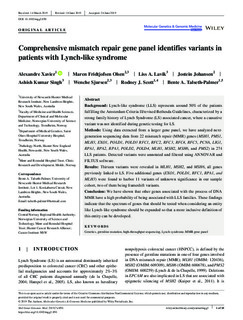Comprehensive mismatch repair gene panel identifies variants in patients with Lynch-like syndrome
| dc.contributor.author | Xavier, Alexandre | |
| dc.contributor.author | Olsen, Maren Fridtjofsen | |
| dc.contributor.author | Lavik, Liss Ane | |
| dc.contributor.author | Johansen, Jostein | |
| dc.contributor.author | Singh, Ashish Kumar | |
| dc.contributor.author | Sjursen, Wenche | |
| dc.contributor.author | Scott, Rodney J. | |
| dc.contributor.author | Talseth-Palmer, Bente Anita | |
| dc.date.accessioned | 2020-01-16T10:07:48Z | |
| dc.date.available | 2020-01-16T10:07:48Z | |
| dc.date.created | 2019-10-29T14:39:47Z | |
| dc.date.issued | 2019 | |
| dc.identifier.citation | Molecular Genetics & Genomic Medicine. 2019, 7 (8), 1-10. | nb_NO |
| dc.identifier.issn | 2324-9269 | |
| dc.identifier.uri | http://hdl.handle.net/11250/2636603 | |
| dc.description.abstract | AbstractBackground: Lynch‐like syndrome (LLS) represents around 50% of the patients fulfilling the Amsterdam Criteria II/revised Bethesda Guidelines, characterized by a strong family history of Lynch Syndrome (LS) associated cancer, where a causative variant was not identified during genetic testing for LS.Methods: Using data extracted from a larger gene panel, we have analyzed next‐generation sequencing data from 22 mismatch repair (MMR) genes (MSH3, PMS1, MLH3, EXO1, POLD1, POLD3 RFC1, RFC2, RFC3, RFC4, RFC5, PCNA, LIG1, RPA1, RPA2, RPA3, POLD2, POLD4, MLH1, MSH2, MSH6, and PMS2) in 274 LLS patients. Detected variants were annotated and filtered using ANNOVAR and FILTUS software.Results: Thirteen variants were revealed in MLH1, MSH2, and MSH6, all genes previously linked to LS. Five additional genes (EXO1, POLD1, RFC1, RPA1, and MLH3) were found to harbor 11 variants of unknown significance in our sample cohort, two of them being frameshift variants.Conclusion: We have shown that other genes associated with the process of DNA MMR have a high probability of being associated with LLS families. These findings indicate that the spectrum of genes that should be tested when considering an entity like Lynch‐like syndrome should be expanded so that a more inclusive definition of this entity can be developed. | nb_NO |
| dc.language.iso | eng | nb_NO |
| dc.publisher | Wiley | nb_NO |
| dc.rights | Attribution-NonCommercial-NoDerivatives 4.0 Internasjonal | * |
| dc.rights.uri | http://creativecommons.org/licenses/by-nc-nd/4.0/deed.no | * |
| dc.title | Comprehensive mismatch repair gene panel identifies variants in patients with Lynch-like syndrome | nb_NO |
| dc.type | Journal article | nb_NO |
| dc.type | Peer reviewed | nb_NO |
| dc.description.version | publishedVersion | nb_NO |
| dc.source.pagenumber | 1-10 | nb_NO |
| dc.source.volume | 7 | nb_NO |
| dc.source.journal | Molecular Genetics & Genomic Medicine | nb_NO |
| dc.source.issue | 8 | nb_NO |
| dc.identifier.doi | 10.1002/mgg3.850 | |
| dc.identifier.cristin | 1741745 | |
| dc.description.localcode | This is an open access article under the terms of the Creative Commons Attribution-NonCommercial License, which permits use, distribution and reproduction in any medium, provided the original work is properly cited and is not used for commercial purposes.© 2019 The Authors. Molecular Genetics & Genomic Medicine published by Wiley Periodicals, Inc. DOI: 10.1002/mgg3.850 | nb_NO |
| cristin.unitcode | 1920,14,0,0 | |
| cristin.unitcode | 194,65,15,0 | |
| cristin.unitname | Laboratoriemedisinsk klinikk | |
| cristin.unitname | Institutt for klinisk og molekylær medisin | |
| cristin.ispublished | true | |
| cristin.fulltext | original | |
| cristin.qualitycode | 1 |
Tilhørende fil(er)
Denne innførselen finnes i følgende samling(er)
-
Institutt for klinisk og molekylær medisin [3426]
-
Publikasjoner fra CRIStin - NTNU [37177]
-
St. Olavs hospital [2440]

